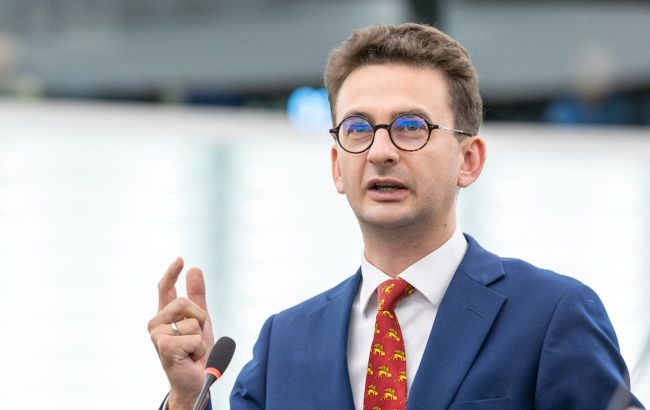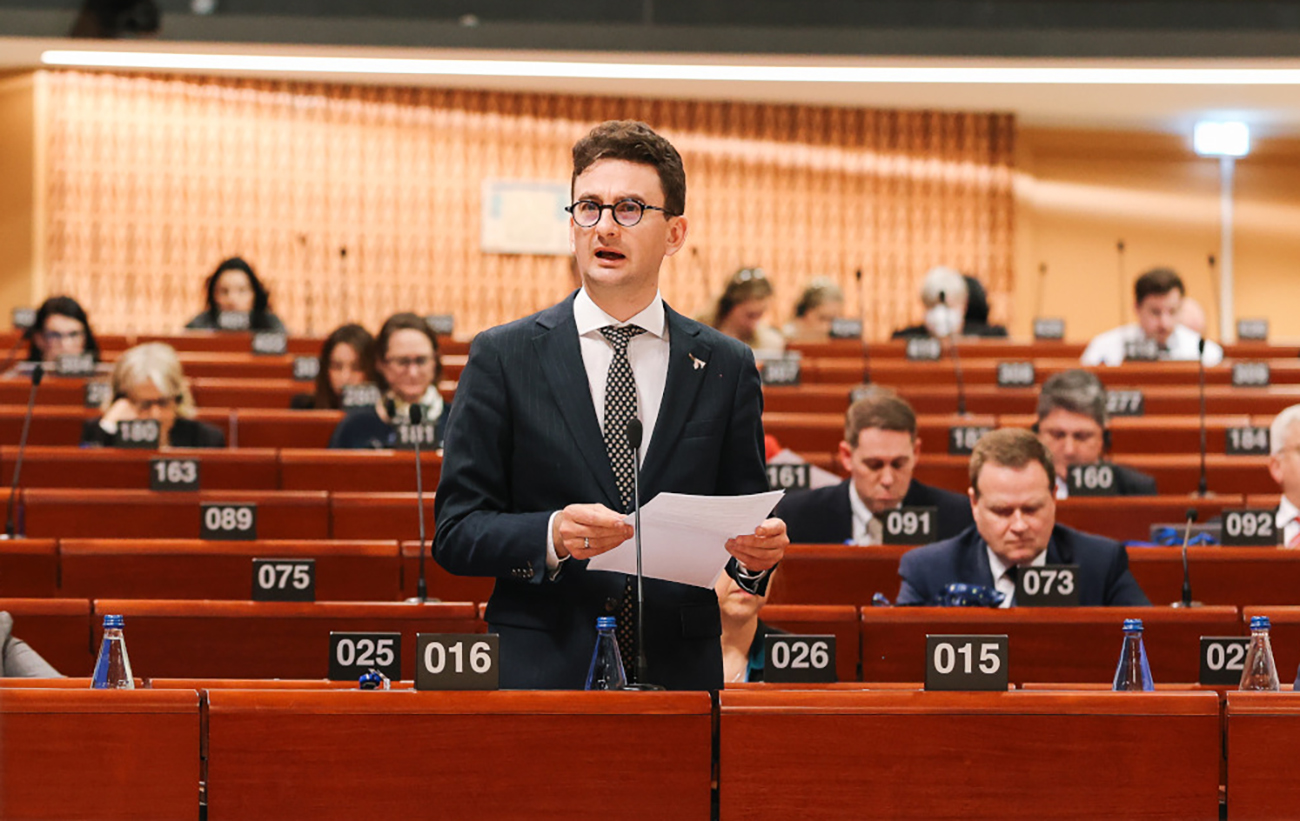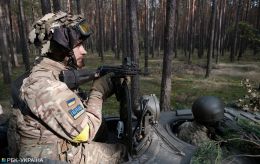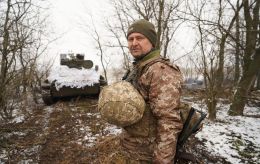ALDE Group Chair in PACE Iulian Bulai: 'If it's not just peace, it's a matter of time when conflict will burst again'
 Photo: Iulian Bulai, ALDE Group Chair in PACE (facebook.com/bulaiiulian2016)
Photo: Iulian Bulai, ALDE Group Chair in PACE (facebook.com/bulaiiulian2016)
What's Europe's role in the peaceful settlement in Ukraine, the risks of a possible behind-the-scenes deal between Donald Trump and Vladimir Putin, the elections in Ukraine and Romania, and other issues are discussed in an interview with the "Alliance of Liberals and Democrats for Europe" (ALDE) Group Chair in PACE, Romanian MP Iulian Bulai.
The ongoing discussions about a "peace plan for Ukraine" may take a more concrete form next week. This topic is expected to be actively debated at the Munich Security Conference, which Trump's special representative for Ukraine and Russia, Keith Kellogg, is expected to attend. Undoubtedly, the American president is currently the key figure setting the trends in global politics, particularly regarding Ukraine.
Against this backdrop, concerns are growing in Kyiv and European capitals that Europe may become involved in the peace process or even confronted with the fait accomplice of a certain deal struck between Trump and Putin.
The Chair of the ALDE Group in the Parliamentary Assembly of the Council of Europe (PACE), Romanian MP and strong supporter of Ukraine, Iulian Bulai, acknowledged in a conversation with RBC-Ukraine that everything will depend on the decisions of the major players who have assumed a role in the Ukrainian issue. At this moment, European leaders may not be able to exert as much influence on the situation due to internal challenges. However, according to Bulai, the Council of Europe could play a crucial role in these processes.
— Last week, PACE adopted the resolution titled ''European Commitment to a Just and Lasting Peace in Ukraine''. But in my opinion, it lacked specifics. So how do see the role of Europe these days, in the Donald Trump era that has just started? Surely, I mean the potential peace process.
— The whole idea of it is in the text – peace and just peace. This is just a matter of a collective reminder of where we are now time-wise. And the legacy of this institution is important not for having kicked Russia out in the spring of 2022, but the legacy of one thing that is completely done, one that is underway, and thirdly, one that we aim for.
First, the register of damage. This is the institution having pushed for that. Tribunal for the crimes that have been committed in Ukraine, the Council of Europe is very strong on that. And then a mechanism for compensation, this is the third thing.
With the new realm of American elections, and with their attitude of questioning the European Union, I think it is the role of the Council of Europe first to set the right narratives on which terms the peace should be dealt with. And this is a just peace. Just peace, meaning that if there were to be an armistice tomorrow, it had to be with conditions accepted by the Ukrainian people.
And who can do that in terms of pushing for this agenda is those that have delivered in terms of objectives till now. The European Union has committed to help financially. It's not enough. We do not have financial resources here, but here we set the narratives, the correct narratives.
So just to go back to your question, it is a matter of keeping high up on the agenda the elements of the peace that we want. It has to be just.
— It is the reiteration of the previous statements.
— So in terms of content, there's nothing new, and you're very right on that. But in terms of opportunity, we must reiterate what should be the terms of the peace that we should achieve in the aftermath of the American elections.
— Do you see any signals that a lasting peace, or at least a ceasefire, may be achieved in more or less foreseeable future?
— Well, we don't have any other information than the scenario exposed by President Trump. So it would be arrogant to base our speculations on scenarios, on other information than what is already public, that he has committed himself to have a ceasefire and a negotiation on peace in Ukraine. And now it's beyond 24 hours since re-election.
— Well beyond.
— So everything is up to a decision from the big players that have assumed this role.
Now here could be also our role, the role of our Secretary General, to be part of the discussions as he has quite an extraordinary background of being president of a country, and not whichever country, but Switzerland, which is the homeland of all the top possible negotiations.
So with this very fortunate overlapping of competencies, the Council of Europe, which delivered to Ukraine an institution and correct narratives until now, and with President Trump's commitment to have a ceasefire and achieve a negotiation, and with Mr. Berset, newly-erected Secretary General, as representing the European values and interests in this process, we should be having an expectation of dialogue that would include us in the coming months.
— As you have mentioned, the 24-hour plan is over now, it is replaced by perhaps a 100-day plan by Special Envoy Kellogg. Do you think that it really may work? And is it correct to set any specific deadlines, like 100 days, 200 days, three months, six months, seven and a half months?
— I do not operate with this understanding because we don't know. It would be a very wrong speculation. We see that now President Trump is more interested in domestic issues, like his public administration, and rather a relationship on American soil with its neighbors, and also Latin America.
So we will see when will Europe's turn come, when will Ukraine come on his agenda. So more than this, it would be very wrong of me to speculate.

Iulian Bulai (Photo: Press Service of the Council of Europe)
— Do you have a fear that Donald Trump and Vladimir Putin may strike some sort of a ''deal'', that Mr. Trump is talking a lot about, behind both Ukraine's back and also Europe's back?
— As a Romanian, the Ribbentrop-Molotov Pact is something that is very much a matter of awareness in Romania. And that precedent shows us that we should never exclude any type of dialogue that could take place.
I'm not trying to be worrying without any sufficient base, but I would like us not to exclude any scenario that we don't have any control over right now.
— But are there any options for Europe – I'm talking about Europe as a whole, without referring to a specific institution – not to lose their initiative in this process? Because now, as you said, Donald Trump is the one who sets the terms, and everyone just reflects on it.
— Well, it's a very unfortunate situation in Europe, with Great Britain not being part of the EU, with Germany being in the middle of their election campaign now, with a weakened French government.
So this is why I am rather afraid of the capacity of European leaders in the current moment to be able to influence that much. Of course, I wish they would do it so, I wish they would have the strength. The idea of the European Council's unanimity principle is not helping the Union for more action.
This is why I think that it could be the Council of Europe inviting for negotiations. Not OSCE, not the United Nations. With the European Union divided, then why not the Council of Europe?
— So who should sit at the table? Perhaps the Americans, the Russians, the Ukrainians, perhaps the Chinese, the Europeans?
— I think we are already very much ahead with possible scenarios, and it's a tricky game. What I say is that the Council of Europe should be welcoming the 3-4 relevant actors that regard the Russian invasion of Ukraine, because we are the house of justice.
And if that is to take place, the international warrant on arresting some war criminals and heads of state should be applied. So we cannot say that we are creating a tribunal, and on the other hand, we're giving an amnesty. So this is a challenge, but we will have the institutional moral authority to do it because it hasn't been the United Nations or the European Union pushing for the tribunal, it's been the Council of Europe.
So I think this would be the way out of it. If we are to discuss peace and justice, the Council of Europe should play a role given its merits until now on the issue.
— In all the debates about different peace plans, one often speaks too much about Trump's ideas. Ukraine's reactions, Europe's role but forgets about another key player – Moscow. Without Moscow, there will be no deal at all. Do you see any signals of Russia's willingness to stop the war in the future?
— I rather see an escalation now from the Russian side. So no, I do not see that. There may be an escalation before the de-escalation, in order to suit them for the negotiations.
But this could just be a pure speculation from my side. What I know, and I know it with clarity, is that once you start those talks, they can decide on ceasefire and peace. But if it's not just peace, it's a matter of time when the conflict will burst again and when the dictator will go ahead with occupying more territories and invading other countries.
So this element of justice when talking about peace is important. And also the judicial international understanding of a war criminal that one has to arrest when coming at one of the member country signatories of the treaty (the Rome Statute - ed.). So time will show.
More speculations are quite useless now. There's so much changing from one day to another.
— On the one hand, we are talking about negotiations, which presume certain concessions from each side. And on the other hand, we mention tribunals, war criminals, etc. How can this be interconnected and work in practice?
— You are very correct. In practice, this could be applied just if the meetings are taking place in a country that is not a signatory of the treaty, or the court so that the warrant would not be applying.
Or if all the partners are traveling to Russia, which I would rather exclude. Or rather, just have online discussions and meetings as one could not apply the warrant then.
— PACE pays a lot of attention to free and fair elections. In Ukraine, we had to postpone them for obvious reasons. In your opinion, when should the elections in Ukraine take place, after the ceasefire or truce or whatever? And if there is no truce this year, how long should we wait? Another year, two, five?
— This is up to the Ukrainian people to decide. I have no opinion on that. But you cannot have elections with martial law being applied.
— And no ways to circumvent?
— No, because martial law implies a suspension of all the elements of the democratic elections and rule of law. And you cannot fully be compliant with the conventions regulating the elections at international standards. This is why this is a futile answer, or even a question, as long as we have martial law.
So, as long as that is the case, no elections can happen, we should just wait till the end of it. And then the Ukrainian people should decide whether it suits them to have elections or not.
— Whenever the martial law ends, do you think this is possible to make free, fair, and democratic elections in several months, taking into account how many different troubles with elections we will have? We have the destroyed infrastructure, the millions of refugees, and so on. Is it possible to solve, technically?
— Technically, it is possible. It's a matter of how you do it. If you have suspended martial law, then all the regular principles of the rule of law apply. But then the question is, would you have an ad interim government doing that? Or would you have the current government preparing (elections - ed.)?
— Perhaps, so.
— Or the current government with limited rights? So, we do not have that much information on the transition period, because that is also important.
And there are scenarios… People say that once martial law is being suspended, you might have a new technocratic government dealing with a new political situation, or just a continuation of it until the election, or just a continuation with full ambitions and powers. This is a matter of Ukrainian internal political dynamics that I have almost no opinion on. And it's not up to me to discuss the possible outcome.
But of course, we have in mind different scenarios that could be applied.
— One of the issues regarding the election that is very widely debated in Ukraine is the possibility of online voting. For example, for millions of our refugees in Europe and elsewhere. Do you think this may be an option?
— This can always be an option. The Estonians use it. The question is, does one have the capacity to apply it? To six to eight million refugees?
In an era of artificial intelligence, everything is possible. But will it be secure enough, or will it give enough access to that process, to everyone willing to do so? I have no answer to that. But of course, this is an opportunity.
Why not? A crisis could have offered the possibility of a fresh start. That is also an option.
.jpg)
Session of the Parliamentary Assembly of the Council of Europe (Photo: Press Service of the Council of Europe)
— The last topic I want to discuss with you is the global fight between democracy and autocracy. Don't you have the feeling that democracy is slowly losing this fight? For example, we have the case of Georgia, you were the rapporteur on this, here at PACE.
— Well, the question is good. The answer has lots of nuances. We see now anti-dictatorial forces winning in Syria.
So you see, on one hand, the Russian interference in the Moldovan elections with vote buying. But also, you see a fantastic president of Moldova strengthening the democracy of a little country with few resources.
So when speaking about that, one should keep in mind that the complex processes apply differently in different countries. For instance, in Germany now, you have a rising extreme right party getting bigger and bigger in the polls. As such, that is a democratic process, but it affects its quality.
The extreme right and extreme left parties have the right to exist. But the quality of democracies worsens when you have people exposing radical ideas that are populistic and actually sound good for some people but do not offer solutions. And this is more and more to see around Europe, including in my dear Romania.
— This is what I also wanted to talk about – oncoming elections in your country. Ukrainians are worried about them.
— Switching over to Romania, you have – between the extreme left movement and extreme right (and rising) movement and the oligarchic movements – you have something that is called ''the new obscurantism movement'', which is a combination of mysticism, new religion, conspiracy theories, anti-science statements, isolationism, ultranationalism. Altogether, this does not make them extreme left, extreme right, or pro-Russian, just quite lunatic.
This is why we just call them obscure. So this is a new phenomenon, because it combines all these elements, being quite right-centered in social values, but being leftist in economics, they want to nationalize all the multinationals in the countries. This is not a right-wing policy, this is rather communist.
— Bolshevik policy.
— Yes, so this is why you would not say they're extreme right, because they're not, in the classical understanding. They are an amalgam, a mixture.
— And this combines with the glorification of different figures of Romanian history of the 1940s, altogether.
— It’s creating a huge obscure movement that is very dangerous.
— And Călin Georgescu is ahead of this movement.
— Him too, yes. The thing is that there's something very, very weird happening. As the polls show, despite this big movement in Romania, 90% of Romanians are for NATO. 90%! So these people, some of them belonging to this movement, actually do not perceive them as being anti-NATO.
— But Călin Georgescu is anti-NATO.
— Yes.
— So they support NATO and support the guy who is against NATO, at the very same time.
— Yes, fully. This is because there is a lack of understanding of the true identity of these political messages. So this is what makes us look into the phenomenon with an open mind on where the establishment does wrong, as long as people support NATO, but also support a lunatic working against that.
— Last week there was a scandal with Mr. Georgescu when he said that Ukraine is a ''failed state'', and also expressed some ambitions about grabbing parts of our land. There was an official reaction by Romanian authorities, and these ideas look really insane. But how popular may they be in Romanian society?
— Well, it's a good question with different answers. On this topic, I don't know, because Romanians have voted with great numbers to not have any extraterritorial revendications. Our borders are fixed.
Our state does not want a single piece of land from any of our neighbors. Not even Moldova. Not even north of Bulgaria. Once a country enters the Union, it cannot have any extraterritorial revendications.
So, of course, people might be using some elements of the past in order to create distress and win political games. Yes, one could do that, but our constitution is very clear. Our engagements are very clear.
I'm not representing the government. The government has stated very clearly that we do not have those types of revendications. We fully support Ukraine's territorial integrity.
The president of my party went out with a very harsh critique against Călin Georgescu, pointing out how lunatic he is. We've just been warning people he's not good in his head. He has got some serious problems.
And it's been very much appreciated by our folks. So, of course, a democracy implies allowing people to say whatever they want. May it be something totally wrong or incorrect or inadequate.

